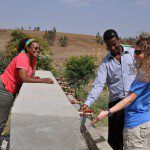 Imagine pulling into a drive-thru at your favorite restaurant. As you pull up to the speaker box and begin looking at the menu, you expect to hear a familiar question. Something along the lines of: “Welcome to Chick-Fil-A, may I take your order?”
Imagine pulling into a drive-thru at your favorite restaurant. As you pull up to the speaker box and begin looking at the menu, you expect to hear a familiar question. Something along the lines of: “Welcome to Chick-Fil-A, may I take your order?”
You order. The attendant confirms your order verbally. Question, answer, confirmation of understanding. The Chick-Fil-A attendant does not tell you that you are looking overweight and shouldn’t value size your fries. (But he does give you that option, should YOU want it.)
It’s such a great model of communication, that relationship expert Gary Smalley recommends using it in marital conflicts!
Today I’m going to apply it to international development, and the challenge of listening well.
I have observed over the years that not everyone adopts this posture when it comes to helping orphans, vulnerable children, or people trapped in poverty. We say things like:
You need clean water! I want to drill a well and build a bathroom!
You need more food! I want to give you a kitchen and a container of meals!
You need more entrepreneurs and businesses! I want to start microenterprise loans!
When we start with “You need ____________,” we miss the opportunity to listen well to the needs of others. At the drive-thru, the attendant won’t have a job much longer if he doesn’t listen to the needs of his customers.
In international development, being a good listener is paramount. It helps establish community leaders as valued partners in their own development. Community leaders know what works, and what doesn’t. They know their needs far better than any outsider would.
By listening first, you may find out that a community values education more than food because food is a little easier for them to get on their own…but education is completely beyond their reach.
At Children’s HopeChest, we articulate our commitment to listening to local leadership like this:
We believe that God has granted us the resources to empower great change, and an opportunity to participate in the transformation of communities. We do this through collaboration with local leaders who are most familiar with the challenges their community faces and able to identify sustainable solutions. We are doing ministry WITH international communities, not for them or to them.
Recently, this was expressed in the completion of a water well in Ethiopia at the Trees of Glory CarePoint. This is an amazing story that starts with one woman’s dream to bring clean, fresh water to the CarePoint she runs in Ethiopia. Simret had a dream that she shared with Karen Wistrom and Children’s HopeChest. We listened. Together we planned. And today, water flows.
It does not flow because we said it needed to. It is there because Simret entrusted her dream to partners. It took longer than we hoped. Take a moment to read more about Simret and the Trees of Glory CarePoint, and how this project started with listening to the dreams of a community in need, and ended with fresh water for orphans and vulnerable children.
Click to read more about Simret & the new clean water well at Trees of Glory CarePoint.
